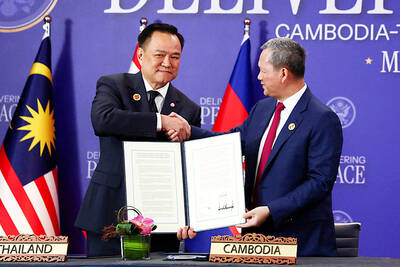Canada blasted China on Thursday for sentencing a Canadian citizen to life in prison on terrorism and separatism charges in a closed trial, saying the verdict had soured relations between the two countries.
Huseyin Celil, 37, a Chinese-born ethnic Uighur, was sentenced to life in prison for "the crime of splitting the motherland" and involvement in terrorism, China's foreign ministry spokesman Liu Jianchao (
Celil was extradited from Uzbekistan to China during a trip in May last year where he vanished into Chinese custody. Canadian diplomats tried to gain access to him in Uzbekistan and are trying to gain access to him in China.
Foreign Affairs Minister Peter MacKay told reporters: "The stakes are very high for Mr Celil and certainly this case has had a spillover impact on Canada's relationship with China."
In a statement, he said Ottawa "remains gravely concerned about allegations that Mr Celil has been mistreated while in Chinese custody and possibly subjected to torture," accusing Beijing of a possible "serious breach" of the UN convention against torture.
The verdict comes ahead of a visit to China later this month by MacKay, during which he said he would raise the issue.
"It's been raised at the highest levels including the president of China and I certainly intend to pursue it when I arrive in China next week," he said outside Parliament. "We don't intend to let this case go."
"When it comes to human rights, when it comes to the rights of a Canadian citizen, we will stand tall for that citizen," he said.
MacKay also chided Beijing for "persistently refusing to respond adequately to our concerns with respect to due process" for Celil and for failing to grant Canadian diplomats access to him "in spite of repeated requests."
Dual citizens
"As we believe that China did not live up to the spirit of the 1999 Canada-China consular agreement in this case, we will be conducting a review of this agreement to determine whether it is, in fact, an effective means of safeguarding Chinese-Canadian dual citizens traveling on Canadian passports," he said.
The minister said he registered his "deep disappointment" with the Chinese charge d'affaires in Ottawa and told Celil's wife the Canadian government would continue to "pursue justice" for him.
"We strongly urge the Chinese authorities to respect their commitment to provide Canadian officials with information about Mr Celil and to ensure that he is accorded due process," MacKay said.
Earlier, Liu had said: "The case of Huseyin Celil is an internal affair and Canada has no right to interfere."
The diplomatic row is the latest in a series of bilateral irritants that have included talks between a senior Canadian official and the Dalai Lama, accusations that China is spying on Canadian corporations, Canada's failure to deport a Chinese fugitive who allegedly steered a multibillion-dollar smuggling ring as well as stalled trade negotiations.
Celil fled China a decade ago and arrived in Canada in 2001 as a refugee and became a Canadian citizen. He was arrested in Tashkent on March 27 last year while trying to renew a visitor's visa in the Uzbek capital.

Shamans in Peru on Monday gathered for an annual New Year’s ritual where they made predictions for the year to come, including illness for US President Donald Trump and the downfall of Venezuelan President Nicolas Maduro. “The United States should prepare itself because Donald Trump will fall seriously ill,” Juan de Dios Garcia proclaimed as he gathered with other shamans on a beach in southern Lima, dressed in traditional Andean ponchos and headdresses, and sprinkling flowers on the sand. The shamans carried large posters of world leaders, over which they crossed swords and burned incense, some of which they stomped on. In this

‘NO COUNTRY BUMPKIN’: The judge rejected arguments that former prime minister Najib Razak was an unwitting victim, saying Najib took steps to protect his position Imprisoned former Malaysian prime minister Najib Razak was yesterday convicted, following a corruption trial tied to multibillion-dollar looting of the 1Malaysia Development Berhad (1MDB) state investment fund. The nation’s high court found Najib, 72, guilty on four counts of abuse of power and 21 charges of money laundering related to more than US$700 million channeled into his personal bank accounts from the 1MDB fund. Najib denied any wrongdoing, and maintained the funds were a political donation from Saudi Arabia and that he had been misled by rogue financiers led by businessman Low Taek Jho. Low, thought to be the scandal’s mastermind, remains

Near the entrance to the Panama Canal, a monument to China’s contributions to the interoceanic waterway was torn down on Saturday night by order of local authorities. The move comes as US President Donald Trump has made threats in the past few months to retake control of the canal, claiming Beijing has too much influence in its operations. In a surprising move that has been criticized by leaders in Panama and China, the mayor’s office of the locality of Arraijan ordered the demolition of the monument built in 2004 to symbolize friendship between the countries. The mayor’s office said in

FIGHTING CONTINUES: Thai military dropped 40 bombs on border areas, Cambodia said, while Bangkok said Phnom Penh launched heavy attacks and damaged homes Cambodia yesterday accused Thailand of intensifying its bombardment of disputed border areas, even as officials from the two countries attend a multi-day meeting aimed at negotiating an end to deadly clashes. The neighbors’ long-standing border conflict reignited this month, shattering an earlier truce and killing more than 40 people, according to official counts. About 1 million people have also been displaced. Cambodian and Thai officials were in their third day of talks at a border checkpoint, with ministers of defense from the two countries scheduled to meet today. However, the Cambodian Ministry of National Defense said Thailand’s military carried out a heavy